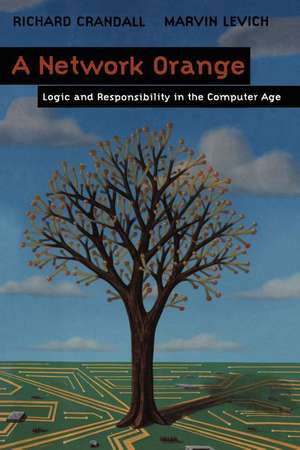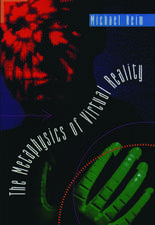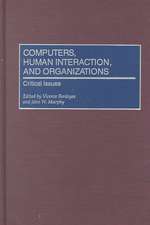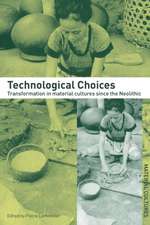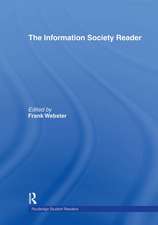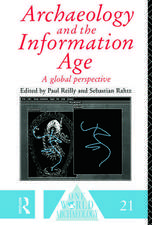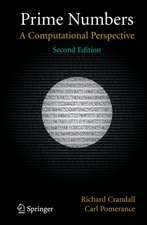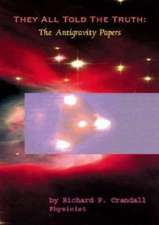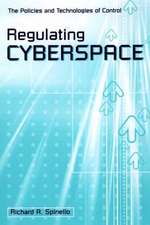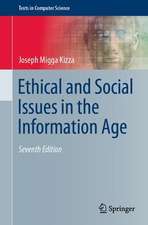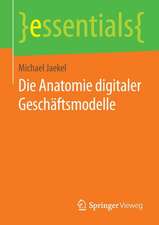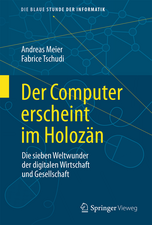A Network Orange: Logic and Responsibility in the Computer Age
Autor Richard Crandall Cuvânt înainte de H. Rheingold Autor Marvin Levichen Limba Engleză Paperback – 16 sep 2011
Preț: 249.86 lei
Preț vechi: 312.32 lei
-20% Nou
Puncte Express: 375
Preț estimativ în valută:
47.81€ • 49.92$ • 39.57£
47.81€ • 49.92$ • 39.57£
Carte disponibilă
Livrare economică 15-29 martie
Preluare comenzi: 021 569.72.76
Specificații
ISBN-13: 9781461274438
ISBN-10: 1461274435
Pagini: 152
Ilustrații: XVI, 130 p.
Dimensiuni: 155 x 235 x 8 mm
Greutate: 0.22 kg
Ediția:Softcover reprint of the original 1st ed. 1998
Editura: Springer
Colecția Springer
Locul publicării:New York, NY, United States
ISBN-10: 1461274435
Pagini: 152
Ilustrații: XVI, 130 p.
Dimensiuni: 155 x 235 x 8 mm
Greutate: 0.22 kg
Ediția:Softcover reprint of the original 1st ed. 1998
Editura: Springer
Colecția Springer
Locul publicării:New York, NY, United States
Public țintă
Popular/generalCuprins
1 A Conspiracy Of Parts.- • Doubly flawed anatomical design.- • Computer technology as a product of world war.- • The brilliance of John von Neumann.- • When there was one transistor per person.- • A game of leapfrog.- • The “cotasking” of biological systems.- • Neural networks and genetic algorithms.- • The promise of nanotechnology.- • Quantum computation.- • The fate of the conspiracy.- 2 Toward A Theory Of Machine Consciousness.- • The boondoggle of artificial intelligence.- • Double obfuscation.- • Extreme difficulty.- • Progress in AI.- • Input starvation.- • Output modes: expert systems and intelligent agents.- • The mysterious “Gedankenexperiment”.- • A theory of machine consciousness.- 3 Multimedia: Mélange Obscur.- • A night at the opera.- • The meaning of media.- • Visual data.- • Audio data.- • Text still suffers.- • Ink as data medium.- • Teleconferencing as canonical testbed.- • A scenario for unified multimedia.- • Scientific visualization and the demolition of science.- 4 A Network Orange.- • Unpredictability.- • Oracles and actors.- • The BBS as canonical educational testbed.- • Language mangling.- • The emergence of the World Wide Web.- • On the issue of network responsibility.- 5 Virtual Reality, And All That.- • What does virtual really mean?.- • VR implementations.- • The fascination with VR.- • From little reality to big reality.- • Simulating from the vacuum.- • Maps, models, and immersion.- • The Holy Grail.- • GVR.- 6 Education Be Not Automatic.- • Education pursuant to technology.- • What education is and what it is not.- • Incremental revolutions.- • Enriching the curriculum with the computer.- • Computer technology and liberal education.- •How not to teach writing.- • From words to pictures.- • The Scottish Verdict: not proven.
Caracteristici
Discusses the emergence of computers as an elemental force in our modern society. Written by a powerful tandem of a scientist and philosopherwe see a balanced viewpoint of the issues addressed. This thoughtful analysis provides readers with a much better understanding of the limitations of new technologies, along with propositions for better use and implementation of them within a cultural context.
